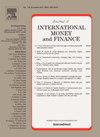Exchange rate regime and optimal policy: The case of China
IF 3.3
2区 经济学
Q2 BUSINESS, FINANCE
引用次数: 0
Abstract
This paper studies optimal financial taxes under alternative monetary regimes in a small open economy with Chinese characteristics. Entrepreneurs issue foreign currency-denominated debt but often encounter financial constraints. We focus on three types of external shocks: foreign interest rate shocks, foreign demand shocks, and exchange rate shocks. Foreign interest rate and exchange rate shocks affect the Chinese economy mainly through the financial channel, while foreign demand shocks primarily affect it through the trade channel. Either an optimal capital inflow tax or an optimal financial regulation tax, or an optimal joint policy leans against the wind due to pecuniary externalities caused by financial frictions. This, in turn, leads to more stable macroeconomic variables and higher welfare. In addition, a more flexible exchange rate regime can effectively mitigate the impact of external shocks on the Chinese economy and contribute to increased welfare.
汇率制度与最优政策:以中国为例
本文研究了中国特色小型开放经济中不同货币制度下的最优财政税收问题。企业家发行以外币计价的债务,但经常遇到资金限制。我们关注三种类型的外部冲击:国外利率冲击、国外需求冲击和汇率冲击。国外利率和汇率冲击主要通过金融渠道影响中国经济,而外需冲击主要通过贸易渠道影响中国经济。最优的资本流入税或最优的金融监管税,或者最优的联合政策由于金融摩擦引起的货币外部性而逆风而行。这反过来又会带来更稳定的宏观经济变量和更高的福利。此外,更灵活的汇率制度可以有效减轻外部冲击对中国经济的影响,并有助于增加福利。
本文章由计算机程序翻译,如有差异,请以英文原文为准。
求助全文
约1分钟内获得全文
求助全文
来源期刊

Journal of International Money and Finance
BUSINESS, FINANCE-
CiteScore
4.20
自引率
4.00%
发文量
141
期刊介绍:
Since its launch in 1982, Journal of International Money and Finance has built up a solid reputation as a high quality scholarly journal devoted to theoretical and empirical research in the fields of international monetary economics, international finance, and the rapidly developing overlap area between the two. Researchers in these areas, and financial market professionals too, pay attention to the articles that the journal publishes. Authors published in the journal are in the forefront of scholarly research on exchange rate behaviour, foreign exchange options, international capital markets, international monetary and fiscal policy, international transmission and related questions.
 求助内容:
求助内容: 应助结果提醒方式:
应助结果提醒方式:


